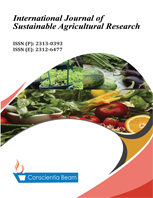Socioeconomic Impact of Bagging Technology for Value Addition in Mango in the Chittagong Hill Tracts of Bangladesh
DOI:
https://doi.org/10.18488/journal.70.2019.64.203.212Abstract
The study was conducted in eight selected villages in the Chittagong Hill Tracts (CHT) of Bangladesh aiming to perceive the socio-economic impact of bagging technology on farmer’s income and livelihood and to know the factors affecting adaption of pre-harvest mango bagging technology. Findings of the study revealed that a few varieties in particular BARI Mango 4, BARI Mango 8, BARI Mango 3, Mallika and Arshina were reported to be the most preferred varieties for bagging because of less pest attacks, attractive color and higher market prices. The average market price received from bagged mango was 74% higher than non-bagged mango. The difference of average gross margin of bagged and non-bagged mango was recorded Tk.22790 per ton which implies that bagged mango was more profitable than non-bagged mango. According to the survey report on an average 15.7% of the annual gross income was increased due to adoption of bagging technology whereas this technology contributed 25.13% increment in income from mango selling. About 96% of the respondents admitted that they were able to control fruit flies and 92% of them confirmed that they were able to produce safe and toxicity free fruits utilizing pre-harvest bagging technology. The price of bagged mangos, training, research contacts, extension contacts, risk taking behavior and willingness of farmers influenced the adoption process significantly. This technology should be disseminated for the welfare of the hilly areas with maintaining proper time and methods.

